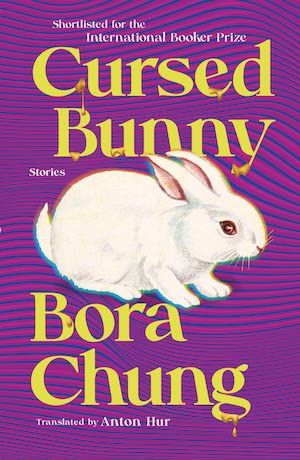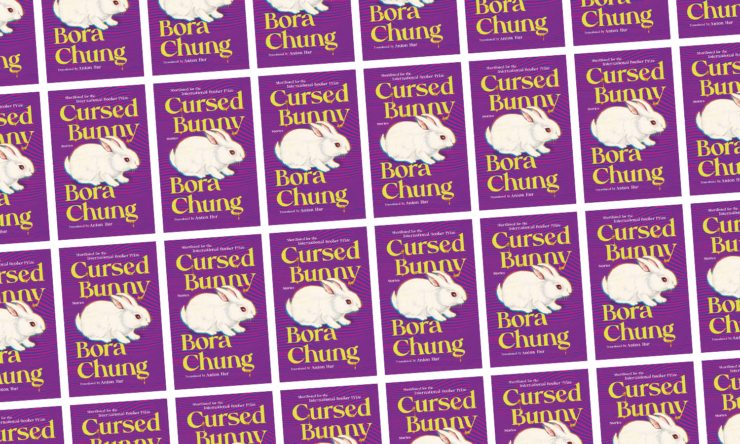Originally published in 2017, Cursed Bunny is South Korean writer Bora Chung’s first work to be translated into English by Anton Hur, and the second of his translations to be shortlisted for an International Booker Prize. Chung is a writer and a translator of Russian and Polish writing into Korean, and a political activist, whose opinions on societal norms and systems are clear in each of the strange, surreal and sometimes shocking stories that make up Cursed Bunny.
The opening story, The Head, is about a literal head that emerges from a woman’s toilet, an entity made up of all the things that her body evacuates and are flushed away. While the conceit may disgust some and amuse others, Chung plays it straight all the way through, never cracking a smile, as it were. Not just does she play it straight, but so do her characters—everyone other than the woman to whom this is happening seems least concerned. When the woman complains about the head in her toilet, she is repeatedly told to ignore it, because it’s not hurting anyone. No one seems particularly shocked or horrified or confused by it, because it does not effect them directly. But Chung doesn’t want us to get over it—she wants us to sit captive and watch as this strange golem made of the woman’s effluvium rises out of the toilet to call her mother. The story is a comment not just on women’s fears being disregarded, but also (eventually) on how we are saddened and horrified by our own bodies as they age and change, and how easily women are dismissed.
Buy the Book


Cursed Bunny
The idea of women not being fully in control of their bodies is repeated in other stories too, particular in The Embodiment, in which a young woman is surprised to find herself pregnant after using too much birth control, and is then continuously told by health care providers that the baby will not be ‘a normal child’ unless she finds a father for it. The story is also a comment on single motherhood and the constant societal pressure and judgment women face when it comes to their bodies, and their personal choices, and the grief of losing yourself in the midst of these pressures.
Chung is very much concerned with bodily autonomy (or lack thereof) and patriarchal control, but also with capitalist greed and the hunger for power, mainly in men. The titular story is about a family who make fetishes, objects used to curse someone who has caused harm. In this case, the fetish is a lamp shaped like a bunny, that is given to an aggressive, greedy competitor who destroys of a small family business. The owner of the the company has no idea that finding rabbit droppings in his warehouse will eventually lead to the total downfall of his massive, successful business, and also to the terribly sad deaths of his family members (no real spoilers here). Corporate greed comes into play, as does the hunger for generational revenge—Chung isn’t taking sides here: there is sadness and loss for both families involved in the curse. No one wins, and it feels like no one ever will.
This theme continues with further, more abject horror stories, that may make you feel like you can’t look away from a nasty, violent train wreck. Scars, the longest story in the collection, brings to mind Le Guin’s The Ones Who Walk Away From Omelas, as Chung begins with the premise of an innocent child sacrificed to keep peace for a community. But she doesn’t stop there. We are forced to watch as the child is repeatedly attacked by a violent monster, eventually getting away physically, but never able to leave behind the violence because, of course, ordinary men can be monsters too. The same society his life saved now shuns him, uses and abuses him, until nothing but rage and fear remain.
Equally horrific is Snare, a fable-like narrative playing on Aesop’s The Goose that Laid the Golden Egg. A man finds an injured fox that bleeds gold, and instead of freeing it, keeps it alive but constantly wounded and bleeding, so he can profit from its pain. Generational curses abound once again, and the man is forced to repeat his evils with his own loved ones, and so the pattern continues.
Most of the male characters in these stories hunger for power but are unable to stop it from corrupting them. Most of the female characters suffer, lose agency and are powerless in the face of patriarchal greed and control. The collection can admittedly feel relentlessly bleak at times, disturbing and frightening but with a staunch moral compass. There is little offered in the way of hope, or grace, or relief, especially in the Cronenberg-esque body horror of some of the more visceral stories, but with Hur’s crisp clean translation of Chung’s effective, simple language, it is hard to stop reading.
Chung’s English publisher calls the collection ‘genre defying’, a phrase used often enough, but in this case very much apt. It is indeed hard to pigeon hole these stories (if one was keen to), and it is hard to describe them in any definitive way, other than to say they are not for the faint hearted. Cursed Bunny is the kind of collection that would warrant half a dozen trigger warnings: rape, incest, extreme violence to name some, and abject horror, if that were to qualifies as a trigger waring. With each of these stories, Chung is peeling back our eye lids, holding them open, forcing us to witness nightmarish horrors of the body and mind, fables that inspire fear; a brutal reality that is just undeniable.
Cursed Bunny is published by Algonquin Books.
Mahvesh loves dystopian fiction and appropriately lives in Karachi, Pakistan. She writes about stories when not wasting much too much time on Twitter.











Uh . . . . hello mods: notice the translator’s name in the article title, which has undergone some kind of odd duplication inside itself/?
@1 – Fixed, thanks!